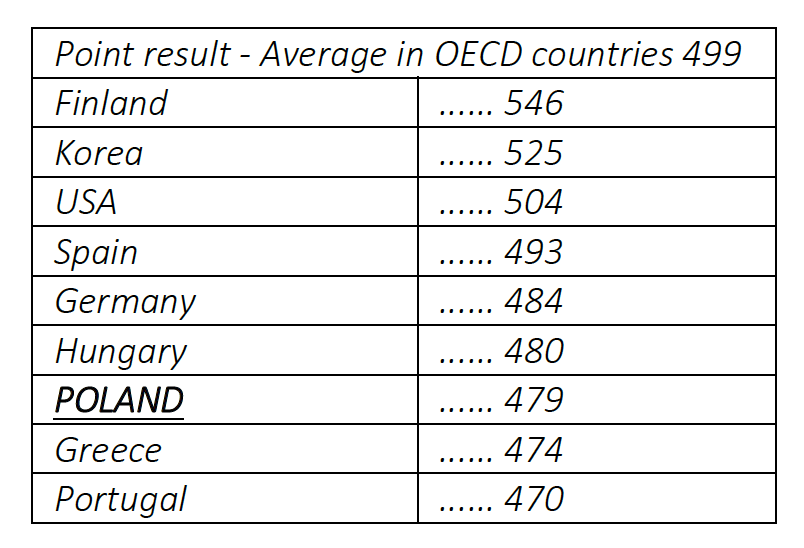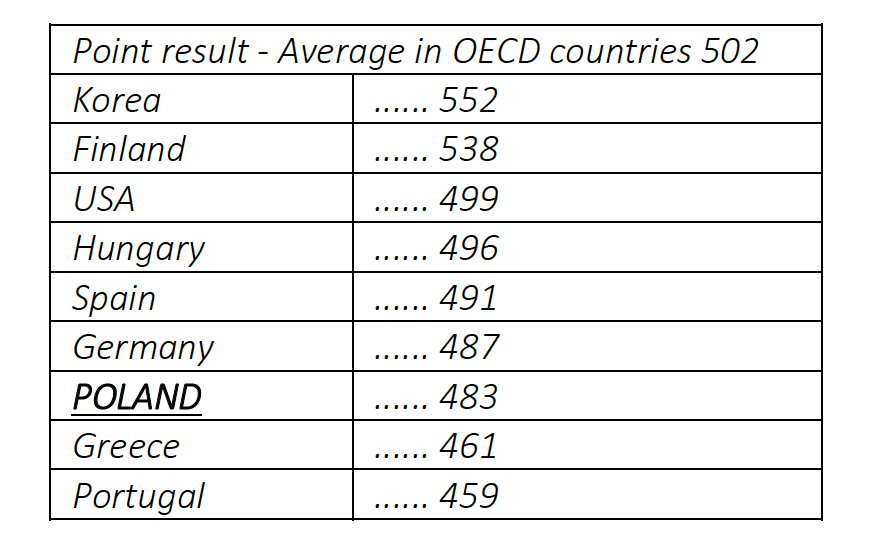
Author: Jolanta Ernest – business trainer, lawyer, university lecturer, image expert, longtime manager conducting social, legal and business negotiations, Specialist in soft competences such as communication, motivation, assertiveness, efficiency, but also in the field of psychology of gender relations and etiquette in business.
Project title: To know and face functional illiteracy
(Conoscere e affrontare l’analfabetismo funzionale)
Project number: 2019-1-IT02-KA204-062395
INTRODUCTION
We are all ignorant to some extent, perhaps even functional illiterates, because it is difficult to expect that educated people will know everything. So a physicist may be illiterate in history; the historian may not know the elementary phenomena of physics. Will we call him illiterate? Can a man who can’t operate a smartphone be called illiterate? So what is this issue about? How to determine the essence of problems? In short, the discussed phenomenon can only be related to the effects of the so-called general education, universal education of adults.
FUNCTIONALL ILLITERACY
What is the essence of contemporary phenomenon of illiteracy, its various types and their specificities? What are the reasons and the effects of adults’ illiteracy, as well as what are the options for preventing these problems?
The term illiteracy is defined as a phenomenon which indicator is the lack of literacy and basic mathematical skills in adults (according to UNESCO criteria – above 15 years of age).
An illiterate is an adult:
- unable to read and write;
- figuratively: having no knowledge in the given field; ignoramus. A half-illiterate is an illiterate person (unlettered).
In modern highly developed societies, this problem is practically marginal in relation to the so-called primary illiteracy. Universality, accessibility and compulsory education eliminate this phenomenon in a fundamental way. However currently, the scale of secondary illiteracy and functional illiteracy is worrying. In case of first one it is about forgetting what was once known, while in the second one it is about understanding the content of the simplest instructions, as well as about the inability to fill in the simplest forms. Mathematical illiteracy or those types of illiteracy that relate to the chosen areas of knowledge or life activity are also a huge problem. Lately it is also found that the concept of cultural illiteracy is developing more and more.
The civilization of Illiterates or ignorant?
Real illiteracy
This phenomenon concerns the lack of literacy in adults (according to the criteria adopted by UNESCO, for respondents over 15 years of age).
There are several levels of literacy: complete, partial and secondary literacy resulting from a loss of previously acquired literacy skills. After all, “human history began with pictures (rock drawings in Australia, Altamera, Lascaux, Sahara) and ends with pictures (television, Internet). “Soon it will turn out that the letter (writing), print and book were short episodes in the history of culture”, wrote one of the most famous Polish writers – Kapuściński (kapuscinski.info/lapidarium- 21 ksiega-proroctw-pytan-i-zdziwien-kapuscinski-widzi-wiecej-recenzja-ksiazki-lapiradium-iii.html). Functional illiterate is a person who has lost reading and writing skills, forgot the components of basic knowledge. In this context, the functional scientific illiteracy should also be mentioned.
Functional illiteracy – the phenomenon in Poland
A significant group of Poles, including those who read, do not understand the messages they are reading and cannot use them in practical way. In addition, there is a large group of Poles who are unable to express in a written form. In this way, the phenomenon of real and functional illiteracy can be related to the common plane, which is the quality of contact with writing, with a written variation of language (literacy). In this case, the functional illiteracy must be seen as one of the reasons of the recognized phenomenon.
Functional literacy is a term that refers to the ability how properly use the information and knowledge for thepurposes of analyzing, arguing and effectively communicating in the processes of putting, solving and interpreting problems in various situations (Skwarek, 2015). Civilization illiteracy is the inability to use their rights, information, technology, cultural goods and organizational solutions. Empirical indicators are usually:
- understanding of utility texts (e.g. operating instructions, drug leaflets, timetables),
- understanding of basic concepts, regulations and orders,
- ability to use new technologies and information services, e.g. a billing program from taxes, calculating the interest rate yourself, etc.
Digital illiteracy – this term is used to describe the inability to use the opportunities offered by informationtechnology. This type of inability must be distinguished from informative illiteracy, i.e. the lack of skills in using information when we consider a set of detached, unrelated data as information. Meanwhile, transforming data into information is the logical process of hierarchization and connection of it. Here are some data from the report (Literacy in the Information …, 2000):
- 80% of Poles do not understand simple information and concepts,
- 81% of Poles cannot formulate short messages,
- 93% of Poles are not able to use new banking techniques,
- 95% of Poles have difficulty using a computer and using the Internet,
- 68% of Poles do not understand internal orders and official instructions.
The Program for International Student Assessment (PISA) implemented since 2000 by the OECD concerns the skills of text comprehension, mathematical thinking and scientific thinking.
1. Text comprehension – results of the OECD / PISA International Student Assessment Program:

2. Scientific thinking – results of the OECD / PISA International Student Assessment Program:

The high level of literacy allows individuals to learn throughout their lives and shapes the high quality of human capital for the needs of the knowledge-based economy. The reason for this situation is mainly a non-modern lifestyle: Poles are ignored by the flood of information. In addition, they make a small number of choices, learn little, because they are unable to work in a group, they are reluctant to retrain, they are easily discouraged.
A school of incompetence
In Poland, the process of falling into functional illiteracy begins just after graduating from primary school: 20% of elementary school graduates have trouble understanding simple readings.
75% of those surveyed by CBOS admit that educating children is a priority for them. In fact, there is no tradition of education in Poland, especially self-education. Poles not only do not absorb novelties, but they also do not have the skills needed in traditional industrial society. According to the IALS report (International Adult Literacy Society – Literacy in the Information …, 2000), 42% of the Polish society is functional cripples, people not only having difficulties with understanding basic texts and information, but also not able to cope in offices, unable to enjoy full civil rights. In the US, this percentage is twice less, and in Sweden even 5 times less.
What’s next?
It is important to make people more aware at the level of school education on the importance of self-education after completing education. Also paying attention to reading books and expanding knowledge in various fields is required. Promoting a kind of fashion for self-development throughout life. Conducting a continuous information campaign, raising public awareness of the phenomenon of secondary and functional illiteracy and their consequences.
In the current period of building global society, the phenomenon of civilization illiteracy reveals its face in the most painful way. Unfortunately, it includes very measurable individual and social losses.
Bibliography:
- Encyklopedia powszechna (1967). Warszawa: PWN.
- Fazlagić, J. (2010). Zjawisko „nadmiaru informacji” a współczesna edukacja. e-Mentor, 4 (36), 47–53.
- Filas, A. (2000). Cywilizacja analfabetów. Tygodnik Wprost, 51 (942), 32–33.
- http://www.sprawynauki.edu.pl/index2.php?option=com_content&task=view&id=895&pop=1&p age=0&Itemid=35 (2.2017).
- Literacy in the Information Age. Final Report of The International Adult Literacy Survey (2000).
- OCDE; www.oecd.org/edu/skills-beyond-school/41529765.pdf (2.2017).
- Masłoń, K. Lapidarium – księga proroctw, pytań i zdziwień Kapuściński widzi więcej. Recenzja książki „Lapiradium III”; http://kapuscinski.info/lapidarium-ksiega-proroctwpytan-i-zdziwien-kapuscinski-widzi-wiecej-recenzja-ksiazki-lapiradium-iii.html (2.2017).
- Skudrzyk, A. (2004). Analfabetyzmy współczesne. Katowice: Wyd. UŚ.
- Skwarek, J. (2015). Analfabetyzm funkcjonalny jako jeden z czynników wykluczenia społecznego.
- Zamość: Wyd. WSZiA w Zamościu.
- Słownik języka polskiego (1988). Warszawa.
- Szewczuk, W. (1966). Psychologia. Warszawa: WSiP.
- Sztompka, P. (2010). Kompetencje cywilizacyjne. Dialog. Pismo Dialogu Społecznego, 2, 77–90.
- Sztumski, W. Paradoksalne społeczeństwo wiedzy. Źródło: http://www.sprawynauki.edu.pl/index2.php?option=com_content&task=view&id=895&pop=1&page=0 &Itemid=35 (2.2017).
- Program Międzynarodowej Oceny Umiejętności Uczniów (OECD/PISA)
5
0 Comments